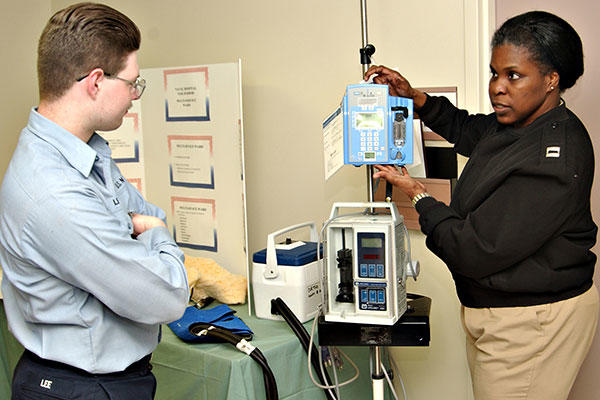At a certain point in their clinical practice careers, many longtime nurses -- even those who have sacrificed much to care for patients -- come to ask themselves, "Is this all there is?"
Leaders in nursing say the answer is an emphatic no. Nurses who have suffered the slings and arrows of the managed-care environment while helping to bring thousands of patients back to health over the years do have a noble alternative: Teaching.
"The most wonderful reason to become a faculty member is that you get to shape the profession," says Geraldine Bednash, executive director of the American Association of Colleges of Nursing (AACN). "Anyone with lots of clinical experience has got some very important perspectives that new graduates need to have."
RNs with master's or doctorate degrees are in great demand as faculty at nursing schools. Indeed, the current nursing-faculty shortage, which the AACN reports at 7.6 percent nationally for the 2008-09 academic year, is a major contributor to the mushrooming shortage of all types of nurses. Nursing schools turned away nealy 28,000 qualified applicants in 2008 due to a shortage of faculty and resources, according to the AACN.
And the shortage of nursing-school professors is expected to worsen in coming years as many faculty retire. According to AACN survey data released in March 2005, 65 percent of the nearly 11,000 faculty members teaching in the nation's bachelor's and graduate nursing programs were older than 50.
Education for Nurses Who Teach
The current emphasis on clinical experience as a key element of nursing education means nurses who teach don't have to give up patient contact. "People can have the joys of being an educator while continuing to do their practice," says Janet Allan, dean of the University of Maryland's School of Nursing in Baltimore.
Teaching in a nursing baccalaureate program does mean earning an advanced degree. About one-third of faculty positions require a master's degree, and two-thirds require a doctorate. Many nurses find ways to earn an advanced degree without entirely giving up their clinical practice income.
Online programs enable nurses to fit graduate study into their busy lives. For example, the University of Maryland's nursing education certificate program is offered both in the classroom and in cyberspace. "The whole program -- all 12 credits -- can be done online," Allan says.
Financial Aid: Needed and Available
Tuition for a graduate nursing degree is likely to run into tens of thousands of dollars, but nurses can get help paying tuition and related costs.
Financial aid for nurses attending graduate school is available from many sources, including the federal and state governments, hospitals and other healthcare employers, nursing associations and nursing schools, as detailed in AACN's financial aid directory.
Some nurses bridge the financial gap by working while they study. That was the path taken by Lisa Lowery, who is simultaneously studying for the University of Maryland's nurse-educator certificate and a doctorate of pharmacology, which she hopes will enable her to become a nursing school's director of pharmacology. "I work 12-hour shifts on Saturday and Sunday as an agency nurse in emergency rooms," she says.
Earning Potential Drops, Then Rises
Perhaps the most difficult obstacle for nurses aspiring to be professors is the salary cut they're likely to experience at the start of their academic careers. The average salary of an emergency room nurse practitioner with a master's degree was more than $95,000 versus about $68,600 for a nurse professor with the same academic training, according to a 2007 survey by Advance for Nurse Practitioners magazine.
But "over the longer term, as they move up the professorial ranks, faculty members with doctoral degrees earn well into six figures," Bednash says.
Other nurses who become teachers are satisfied with the lower salary range and personal benefits associated with working an academic year in a secure teaching position.











